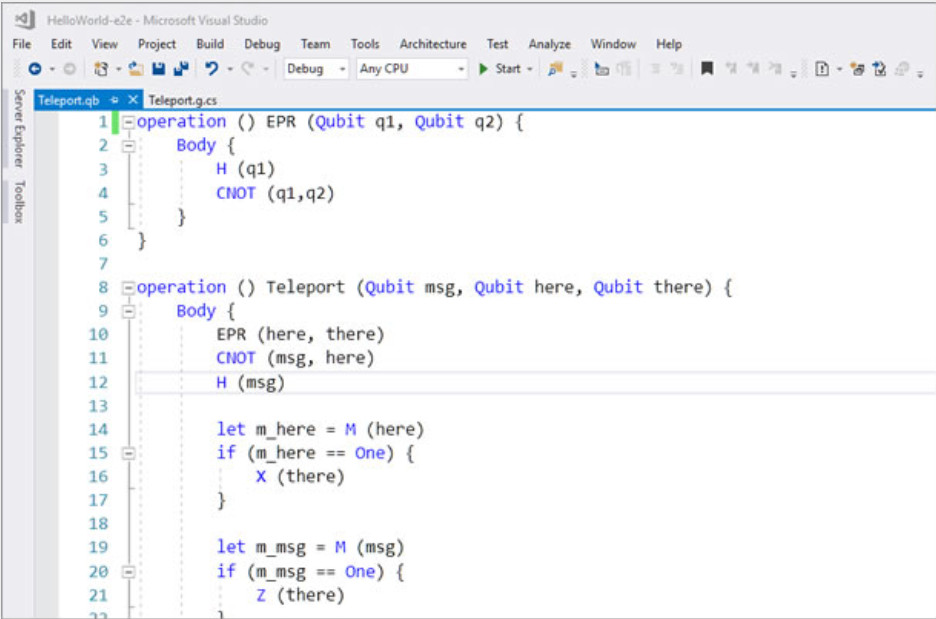| Visual Studio Gets Quantum Language |
| Written by Kay Ewbank | |||
| Wednesday, 27 September 2017 | |||
|
Microsoft has announced it is releasing a new programming language and computing simulator designed specifically for quantum computing, and the language will be included in Visual Studio. Microsoft, like just about every other big-name high tech company, has been enthusiastic about quantum computing - in Microsoft's case since 2005, but until now the research has largely been behind the scenes. Microsoft Research has a team at the Station Q lab on the campus of the University of California, Santa Barbara, with a remit to collaborate with theoretical physicists and to experimentally investigate the topological effects in quantum matter to perform computations. Alongside Station Q, there's also a quantum team in Redmond who have been developing software for these new hardware systems. The research is now at a point where Microsoft CEO Satya Nadella announced at Microsoft Ingite that the company is releasing a new programming language and computing simulator designed specifically for quantum computing. While acknowledging the fact there's still no working quantum computer, Microsoft wants programmers to begin familiarizing ourselves with quantum algorithms and what they might be used for, so that when (or if) the hardware ever appears, we'll be ready. Nadella's keynote was big on enthusiastic visions of the future, but lacking in much detail. However, blogs and research material elsewhere give more details. A post on the Microsoft Quantum blog said that the new quantum computing programming language, which is deeply integrated with Visual Studio, and simulators will be available later this year.
It seems likely, given these screenshots of the new language on the Microsoft Quantum page,s that the as yet unnamed language will be based on Microsoft's existing LIQUi|> open source quantum language. As we explained back in 2015, LIQUi|> stands for Language Integrated Quantum Operations, and at that point was a set of three simulators with F# as a scripting language. Since then it has been updated and used for Quantum programming challenges. It now includes a programming language, optimization and scheduling algorithms, and quantum simulators. LIQUi|> can be used to translate a quantum algorithm written in the form of a high-level program into the low-level machine instructions for a quantum device. LIQUi|> allows the simulation of Hamiltonians, quantum circuits, quantum stabilizer circuits, and quantum noise models, and supports Client, Service, and Cloud operation. It allows the user to express circuits in a high-level functional language (F#), and supports the extraction of circuit data structures that can be passed to other components for circuit optimization, quantum error correction, gate replacement, export or rendering.
Nadella made no mention of LIQUi|>, saying in his keynote: "Microsoft has created an entirely new domain specific programming language optimized precisely for exploiting scalable quantum computers, a language that's deeply integrated into Visual Studio." He said that Microsoft is "on the cusp of empowering a quantum revolution with our unique, topological approach." More practically, Krysta Svore, who has led development of Microsoft software and simulators for quantum computers, described the new language as being designed to let developers create apps to debug on quantum simulators today then run on an actual topological quantum computer in the future: “The same code that you’re running today in simulation you can run tomorrow on our quantum computer” While you may or may not believe this optimistic view, the fact there'll be a Quantum language in Visual Studio does make the technology more mainstream, whatever the eventual outcome.
More InformationRelated ArticlesMicrosoft Open Sources Quantum Computing QScript A Quantum Computer In Your Browser Hunt for Missing Prime Numbers In the Cloud Solve The Riemann Hypothesis With A Quantum Computer Boson Sampling Tests Quantum Computing A Quantum Computer Finds Factors To be informed about new articles on I Programmer, sign up for our weekly newsletter, subscribe to the RSS feed and follow us on Twitter, Facebook or Linkedin.
Comments
or email your comment to: comments@i-programmer.info |
|||
| Last Updated ( Wednesday, 27 September 2017 ) |



